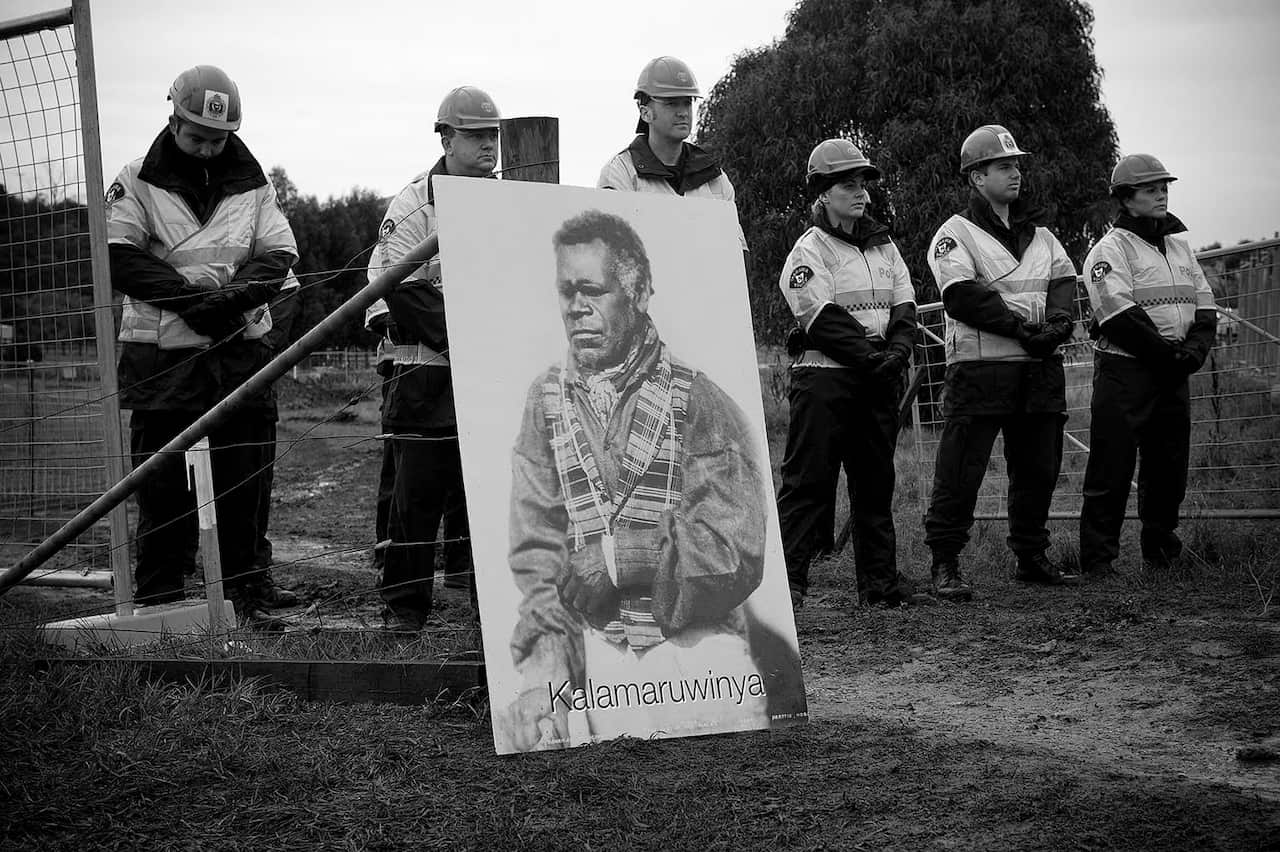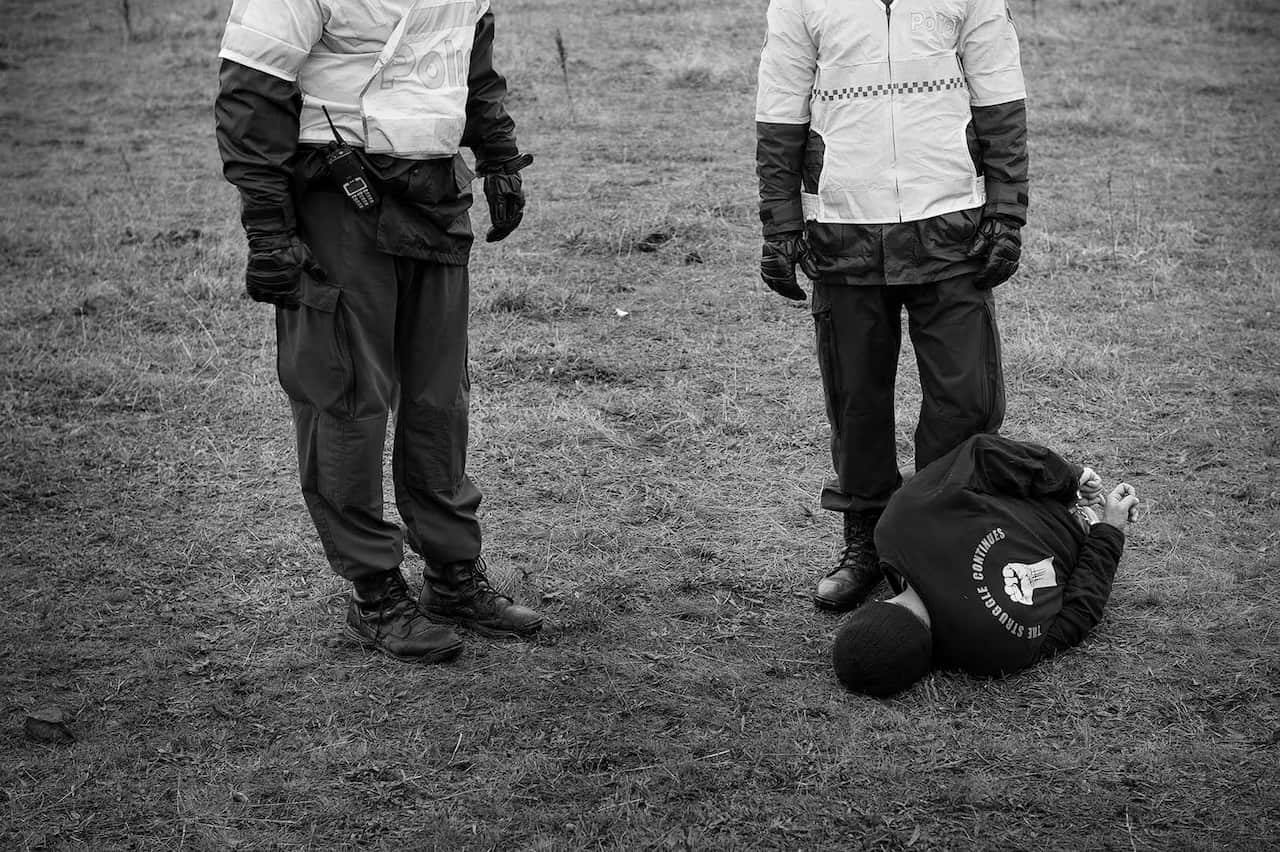CONTENT WARNING: This article may cause distress to members of the Aboriginal and Torres Strait Islander communities. It contains images of deceased persons.
Everyone referred to it as the day the dozers would come. But it was an excavator that creaked and grated into the compound when that day finally arrived. A larger than usual work crew emerged from the troop carriers that morning and started banging in coloured pegs and reinforcing the wire fence that had been installed a few weeks earlier. These weren’t the same workers we’d seen poking around over the last two years. These were ‘bring-ins’, and their arrival meant things were about to heat up.
“Big man with your hard hat and high vis,” said Aaron to the leading hand as he stood beside me at the fence. Aaron Everett was the heritage officer who had blown the whistle on this project. He surveyed the action, holding a mug of coffee just below his lips, elbow cocked straight out to the side. The leading hand didn’t bite, he just continued giving orders to his crew. “I’m talking to you, pinhead. Flew you in to destroy our heritage did they? Couldn’t get a local bloke to do it?”
The man squared up to Aaron and then thought better of it. He backed off and went back to his work. They had been warned, this lot, not to engage with us.
We had tried everything to stop them building this bridge across kutalayna (Jordan River). It was along these banks that generations of our old people had lived and died, and the tools they crafted still lay in the dirt. We promoted several re-routing options. Exhausted legal avenues. Set-up a permanent protest camp, inviting the wider community to get involved. We even set aside community protocol and allowed an archaeologist to conduct a dig. 42,000 years of Aboriginal occupation was the conclusion. Oldest found in Tasmania. But we all learned that isn’t enough to stop a road from going ahead. We only succeeded in embarrassing the State Government.
By the time they rolled the excavator off the skid, a big mob had turned up, and so had the media. The cops lined the road like bowling pins preventing our access to the machine. The head cop addressed us, promising there’d be arrests at the first sign of trouble.
“F—- you, invader,” yelled Aaron, just before the excavator roared to life. Against the gate, someone had leant a large picture of Kalamaruwinya - a tribal man from the local area. A powerful use of imagery. But it was pulled into the machine’s tracks as it clanked through the gate and spat out the back as a wad of shredded plastic.
Against the gate, someone had leant a large picture of Kalamaruwinya - a tribal man from the local area. A powerful use of imagery. But it was pulled into the machine’s tracks as it clanked through the gate and spat out the back as a wad of shredded plastic.

"Against the gate, someone had leant a large picture of Kalamaruwinya - a tribal man from the local area." Source: Matthew Newton
We flowed back and forth along the fence like a school of fish, following the excavator as it zig-zagged towards the lower pegs. I didn’t know who was next to me, our shouts were all the same. We spread ourselves out along the bottom fence, the cops on the opposite side. The machine operator extended out the boom and flexed the bucket back and forwards, giving us a wave. As he lowered it to the ground, the first of us went over.
It wasn’t an easy fence to scale, and with all of us on it or against it, it buckled and swayed. The first person over was a hero. He dove into the hole the machine had just made and locked arms around the bucket. The operator powered down the machine and stood outside on its tracks and calmly lit a cigarette. Two cops scruffed me as soon as I hit the ground. I didn’t resist. Pinned down and cuffed, I watched the others make their dash. This was the culmination of two years’ work trying to protect this place and I took in their efforts with pride. Some of the fast ones evaded the cops and circled the paddock like streakers at a sports game. Some made it to the machine. One girl even climbed on top of the cab and jumped up and down waving an Aboriginal flag. The operator flicked his cigarette butt at her as the cops dragged her down.
Two cops scruffed me as soon as I hit the ground. I didn’t resist. Pinned down and cuffed, I watched the others make their dash. This was the culmination of two years’ work trying to protect this place and I took in their efforts with pride. Some of the fast ones evaded the cops and circled the paddock like streakers at a sports game. Some made it to the machine. One girl even climbed on top of the cab and jumped up and down waving an Aboriginal flag. The operator flicked his cigarette butt at her as the cops dragged her down.

Heritage officer Aaron Everett, handcuffed by police officers. Source: Matthew Newton
It took them 30 minutes to pull our hero out from under the bucket. I heard people cheer for him as I was slung into the paddy wagon, muddy and cold. Aaron was in there, too. As they drove us out, the large crowd gathered at the gates started up a chant.
Something hit the vehicle and scraped along its side. Through a tiny slit in the paddy wagon, I caught familiar words on a placard outside.
“Always was, always will be?” I mused to myself.
“Someone should tell that to the pinheads in charge,” said Aaron as they hauled us away.
Adam Thompson is a pakana (Tasmanian Aboriginal) writer of short-fiction, screen and performance. His debut story collection, Born Into This, will be published by UQP in Feb 2021.
This story is edited by Mununjali author Ellen van Neerven for SBS Voices and is part of a NAIDOC Week essay series inspired by the 2020 theme 'Always Was, Always Will Be'.
National NAIDOC Week (8 – 15 Nov 2020) celebrates the history, culture and achievements of Aboriginal and Torres Strait Islander peoples. Join SBS and NITV for a full slate of NAIDOC Week content. For more information about NAIDOC Week or this year’s theme, head to the official NAIDOC Week website. #NAIDOC2020 #AlwaysWasAlwaysWillBe
Share

